Books by Treasa De Loughry
This book examines how contemporary global novels by Salman Rushdie, David Mitchell, Rana Dasgupt... more This book examines how contemporary global novels by Salman Rushdie, David Mitchell, Rana Dasgupta and Rachel Kushner have evolved new aesthetics to represent global economic and ecological crises. Paying close attention to the interrelations between postcolonial, world, and global literatures, this book argues that postcolonial literary studies cannot account for global crises that exceed the national and anti-colonial. Advocating an interdisciplinary framework informed by a synthesis of materialist literary theory with world-systems theory, combining Fredric Jameson and Georg Lukács with Giovanni Arrighi and Jason W. Moore, this book examines how global literatures metabolise not only socioeconomic conditions, but also transformations in the world-ecology, and emergent developmental and epochal crises of capitalism.
Papers by Treasa De Loughry
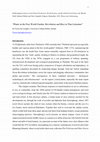
Literary and Cultural Production, World-Ecology, and the Global Food System, 2021
A US diplomatic cable from Thailand in 1960 concludes that “Thailand represents an especially hea... more A US diplomatic cable from Thailand in 1960 concludes that “Thailand represents an especially healthy and vigorous plant in the free world garden” (Johnson, 1960: 1173), summarising the beneficent care the South East Asian nation ostensibly required from its US benefactor in negotiating the free ‘trade’ garden. Seeking to buttress its military and geopolitical might, the US, from the 1950s to the 1970s, engaged on a vast programme of military spending, infrastructural development and ecological programming in Thailand, expanding Green Revolution technologies across the region and plugging subsistence communities into global agri-systems. The consequences of these combined pressures – ideological, technological, and infrastructural – on the region’s actual plants, especially the main export crop rice, dramatically widened regional inequality.
This chapter examines Thai literary responses to transformations in rice as subsistence to rice as commodity, from the 1950s period of US-funded counter-insurgencies and local socio-ecological change, until shortly after the 1973 farmer-student revolution for social justice and land reform, in literary works by Seni Saowaphong, Khamsing Srinawk, and Chart Korbjitti.
By examining texts by these three authors, this chapter maps a cumulative trajectory from 1950s discontent to 1970s revolution and 1980s disenchantment, and argues for a world-ecological analysis of their registration not just of regional or national political upheaval, but also of broader tendencies in the world-system—of US-led developmental programming, eco-modernisation, and anti-communism. The contexts of feudal agrarian practices and US imperialism are crucial to the plotting of works that narrate the post-1950s transition from subsistence to ‘capitalised’ rice, even as these complex histories and practices are sometimes rendered invisible in literary narratives.
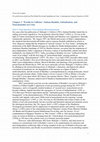
The Global Novel and Capitalism in Crisis - Contemporary Literary Narratives , 2020
Pre-publication draft of a chapter from 'The Global Novel and Capitalism in Crisis - Contemporary... more Pre-publication draft of a chapter from 'The Global Novel and Capitalism in Crisis - Contemporary Literary Narratives' (2020). This chapter maps a transition from the postcolonial disenchantment of Salman Rushdie’s The Moor’s Last Sigh (1995), to the global-American style of The Ground Beneath her Feet (1999) and Fury (2001), and their cosmopolitan mythologizing, geopolitical allegories, and account of American hegemony. It initially examines how The Moor’s Last Sigh rejects the exuberant postcolonial magic realism that characterised Rushdie’s earlier works in favour of a disenchanted realism that focuses on the insufficiency of art to represent Bombay’s globalised criminal capitalism. The section on The Ground Beneath her Feet argues that its deterritorialised rock music mythology embodies the fractures, or irreconcilabilities, of cosmopolitan abstractions of identity and form. The final section on Fury concludes the argument by examining how it operates as a form of fin de siècle ‘world-systemic’ literature that foregrounds the ‘autumnal’ decline of American hegemony through a hyperrealist aesthetics of literary compression and excessive violence.
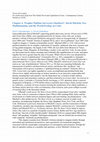
The Global Novel and Capitalism in Crisis - Contemporary Literary Narratives, 2020
Pre-publication draft of a chapter from 'The Global Novel and Capitalism in Crisis - Contemporary... more Pre-publication draft of a chapter from 'The Global Novel and Capitalism in Crisis - Contemporary Literary Narratives' (2020). This chapter examines a transition in David Mitchell’s global novels, from the deterritorialised ‘cosmopolitanism’ of Mitchell’s Ghostwritten (1999) and Cloud Atlas (2004), towards the allegorical significance of financier style Anchorites in The Bone Clocks (2014). It argues that these works attempt to imagine totality through networked narrative forms, producing a pessimistic environmental imaginary concerned with the catastrophic consequences of consumption, extraction, and energy scarcity. The chapter examines the ‘capitalist realist’ modality of these novels, and how they produce a competitive and predacious account of humankind, with Mitchell’s short story ‘The Siphoners’ (2011) and it’s account of an energy scarce far-future linking Cloud Atlas and the final section on The Bone Clocks.
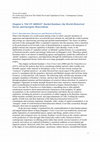
The Global Novel and Capitalism in Crisis - Contemporary Literary Narratives , 2020
Pre-publication draft of a chapter from 'The Global Novel and Capitalism in Crisis - Contemporary... more Pre-publication draft of a chapter from 'The Global Novel and Capitalism in Crisis - Contemporary Literary Narratives' (2020). This chapter on Rachel Kushner’s Telex From Cuba (2008) and The Flamethrowers (2013) examines how both novels use historical narratives and marginal passive narrators to depict the consolidation of post-WWII American imperialism. The first section investigates Telex From Cuba’s ‘energetic materialism’ or how sugar fuels nascent US imperialism in Cuba, expressed through the ‘average heroes’ of historical fiction. The latter half examines The Flamethrowers’ triangulation of oil with accelerationist land art in the US, alongside Italy’s automobile industry and Autonomist protest movements, in ways that figure historical fiction’s drive to narrate totality through the ambivalent form of the ‘peripeteia’. Analysing these two works together unpacks the world-ecological links between American imperialism, oil, and art, amidst deindustrialisation and world revolutionary protest.
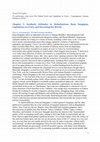
The Global Novel and Capitalism in Crisis - Contemporary Literary Narratives, 2020
Pre-publication draft of a chapter from 'The Global Novel and Capitalism in Crisis - Contemporary... more Pre-publication draft of a chapter from 'The Global Novel and Capitalism in Crisis - Contemporary Literary Narratives' (2020). This chapter examines Rana Dasgupta’s short-story cycle Tokyo Cancelled (2005) and bipartite novel Solo (2009) as world-systemic texts. It firstly reads how Tokyo Cancelled’s fragmented literary form offers a means of cohering narrative and experience during times of great epidemiological and social turmoil. Stories from New York, Lagos and Paris are read through Fredric Jameson’s idea of “situational materialism,” or how crises of capitalism appear differently depending on each character’s perspective on the world-system. The second half of the chapter examines Solo and how the isolated narrator, Ulrich, attempts to achieve a sense of accomplishment by imagining post-revolutionary figures who strategically navigate Bulgaria and Georgia’s catastrophic entry into the world-system after the collapse of the Soviet Union.
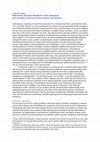
http://contagion.ie/mad-cows-and-eco-pandemic-irish-literature/ , 2020
Blog post for the Contagion project.
Contemporary reporting on Covid-19 has focused on it’s envi... more Blog post for the Contagion project.
Contemporary reporting on Covid-19 has focused on it’s environmental links—we know that Covid-19 is a ‘zoonotic’ disease, or a virus transferred from animal to human populations which emerged in wet or wild food markets in Wuhan in Hubei province, China. Early discussions of Covid-19 conflated this fact with a perceived food-system ‘primitivism’ amongst Chinese consumers, and an assumption that China is the world’s virological ‘hot spot’. But intensive factory farming conditions in the Global North are themselves leading to contagious zoonotic diseases, including new strains of influenza (see Davis chapter 7). In the late-twentieth century the Bovine Spongiform Encephalitis (BSE) pandemic amongst UK and Irish cows, and the resultant human variant Creutzfeldt-Jakob disease (vCJD), threatened the destruction of Ireland’s food safety reputation, and with it a lucrative export industry. Ruth Gilligan’s recently published novel, The Butchers, is set in 1996 during the height of the BSE pandemic in Ireland, and depicts a band of enigmatic traditional beef butchers who are subject to local suspicion once the disease begins to threaten local farmers. Meanwhile an undeterred criminal enterprise imports unlabelled Northern Irish cattle, reselling it as Irish beef despite the public health hazards. Backgrounding the novel are the Northern Ireland peace process, the Republic of Ireland’s nascent economic Celtic Tiger, and a general hubristic celebration of the nation’s reformation from postcolonial periphery to global poster-child. Surprisingly given the dramatic upheavals of the time, and BSE’s easy metaphorization for the nation’s economic greed—it spread partly due to cost-cutting and the cannibalistic processing of diseased animals into meal—it has not until now featured in many cultural works.
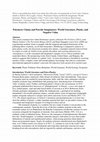
Green Letters: Studies in Ecocriticism, 2019
This is a pre-publication draft of an article that will come out imminently in Green Letters.
T... more This is a pre-publication draft of an article that will come out imminently in Green Letters.
This article examines how Adam Dickinson's poetry collection The Polymers (2013), artist Marina Zurkow's The Petroleum Manga (2014), and Rana Dasgupta's novel Solo (2009) use experimental aesthetic forms to grapple with the temporal and spatial distensions of the polluting effects of plastic, an oil-derived product. Mobilising a comparative analysis of petro-plastic works, the discussion examines how plastic, a mundane material removed from its origins in crude oil, briefly loved, quickly discarded, and exacting unknown toxic consequences, is at the conceptual and imaginative margins of eco-critical aesthetics and materialist theory. By juxtaposing works from Canada, United States, and Bulgaria, the analysis suggests that if plastic is a global 'rock', its local articulation is bounded by recurring narrative forms, complex scales and interdisciplinary knowledge, that enliven a materialist and relational approach to plastic's unevenly felt trajectory from ancient oil to eternal waste.
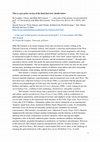
Irish University Review, 2019
Mike McCormack is an award-winning writer and a lecturer in creative writing at the National Univ... more Mike McCormack is an award-winning writer and a lecturer in creative writing at the National University of Ireland, Galway. McCormack’s conscious rearticulation of the West of Ireland as a site of experimental modes of incarceration, virtual imaginaries, and energy regimes, addresses imaginative aporias around Ireland’s production of nature. The environments represented in his works are sites for the weird and uncanny, including near-future realities of offshore clone labour and robot citizenship, machinic fetishism, cloud seeding, and the technological sublime.
In this interview McCormack reflects on a number of questions surrounding his own formal experimentation, the contiguities among religion and technology, contemporary developments in Irish science fiction, representations of rural Ireland, and the compositional rituals of the everyday.
This is a pre-print version of the final interview, details below:
De Loughry, Treasa, and Mike McCormack. “‘…a tiny part of that greater circum-terrestrial grid’: A Conversation with Mike McCormack.” Irish University Review 49.1 (2019): 105–116.
Special Issue on “Food, Energy, and Climate: Ireland in the World-Ecology.” Eds. Sharae Deckard and Lucy Collins.
https://www.euppublishing.com/doi/abs/10.3366/iur.2019.0383
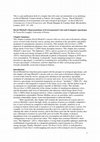
David Mitchell: Contemporary Critical Perspectives , 2019
This chapter examines David Mitchell's concern with eco-crisis and civilizational collapse across... more This chapter examines David Mitchell's concern with eco-crisis and civilizational collapse across several works from his oeuvre, paying close attention to his speculative and global treatment of contemporary narratives of scarcity. This includes Ghostwritten's (1999) depiction of simultaneous planetary crises, and the wave of infestations and infections that brings about Cloud Atlas's (2004) future dystopian narrative. This chapter also examines Mitchell's short-story 'The Siphoners' (2011), and its account of a roving band of paraffin stealers in the post-energy dystopia of 2033, and Mitchell's novel, The Bone Clocks (2014), which portrays the brutal aftermath of global civilizational collapse in 2043 due to over-consumption. Yet thinking 'ecologically' means imagining progressive change beyond eco-apocalypse. I conclude by examining how storytelling is the essential kindling for post-apocalyptic civilizations, and how depictions of other social groups gesture towards sustainable social and ecological relations.
This is a pre-publication draft of a chapter that will come out imminently in an anthology on David Mitchell. Citation details as follows: De Loughry, Treasa. “David Mitchell’s representations of environmental crisis and ecological apocalypse”, in David Mitchell: Contemporary Critical Perspectives eds. Wendy Knepper & Courtney Hopf. Bloomsbury: London, 2019. 133–148.
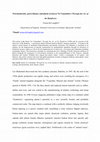
Journal of Postcolonial Writing, 2017
This article reads Karen Tei Yamashita's Through the Arc of the Rainforest (1990) and its account... more This article reads Karen Tei Yamashita's Through the Arc of the Rainforest (1990) and its account of the discovery of the Matacão – a mysterious plastic bedrock found in Brazil's Amazon rainforest – as bound to the nation's recent history of neoliberal financialization and petrolic extraction. The Matacão is examined as an allegory for the dispossession of peasant communities by multinational capitalism through its references to historical resource rushes as well as the developmental arcs of discovery, excavation and exhaustion attending commodity booms. The discussion concludes by examining the text's framing of North American influence in Brazil alongside the emergence of extra-human resistance to the commodification of the Amazon. Amanda Boetzkes and Andrew Pendakis have argued that plastic makes " visible a stratigraphy of oil capital " , and likewise, this article connects the local and global production of petro-ecological surpluses, petro-plastic waste and petro-dollar debt as rendered in Yamashita's novel.
***For a free version of the published article please visit: http://www.tandfonline.com/eprint/PSARPGE33kyfPaj8ra3C/full
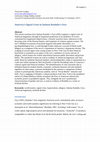
Journal of Commonwealth Literature, 2017
This article examines how Salman Rushdie's Fury (2001) registers a signal crisis of American hege... more This article examines how Salman Rushdie's Fury (2001) registers a signal crisis of American hegemony through its hyperreal production of an aesthetics of excess, constituted by fragmented subjectivities, a frenetic narrative form, references to the decaying years of the Roman Empire, and irruptions of violence against women. The text's libidinal investment of personal anguish with public discontent, or a psychopathological fury, is read through Fredric Jameson's account of third-world allegory as a symptom of the novel's registration of America's hegemonic decline. The scalping of several upper-class young women in New York City by their financier boyfriends is examined as an aspect of the text's aesthetics of excess and use of allegory, which frames the violent interrelation between public discontent and private hubris. The murdered women are read as symbols of American hegemony and class under threat by turbulent financial markets, and hoarding their scalps is represented as a crude and violent attempt by their boyfriends to halt the dwindling value of America's cultural capital and financial markets.
Talks by Treasa De Loughry

Taking up environmental historian Jason W. Moore’s injunction to understand the world-economy as ... more Taking up environmental historian Jason W. Moore’s injunction to understand the world-economy as world-ecology, this three-day event will explore world-systemic approaches to capitalism’s transformations of cultural, environmental, and social landscapes. During two days of workshop presentations and discussions, the first day focusing on World-Ecology, the second on World-Economy, we will investigate the symptoms and causes of the current global economic and climate crisis through multiple disciplinary perspectives, analyse the ecological regimes and geographical frontiers of capital’s uneven expansion, and explore how world-systemic perspectives help illuminate the intertwined issues of environmental crisis and exploitation. With presentations examining such subjects as world-ecology and neoliberalism, Ireland and the world-economy, world-systems and law, and literature and the world-ecology, we hope to create a truly interdisciplinary dialogue between the humanities and social sciences.

In connection to the two-day academic symposium at UCD on “World-Ecology, World-Economy, World-Li... more In connection to the two-day academic symposium at UCD on “World-Ecology, World-Economy, World-Literature,” this cultural evening in Dublin city centre will explore artistic representations of the intertwined themes of environmental and economic crisis. It will feature an exhibition of activist-photography on social and political responses to economic and ecological crisis in post-Tiger Ireland. The exhibition launch and wine reception in the James Joyce St. Gallery will be followed by two readings in the Foley St. LAB from performance poet Dave Lordan, author of Invitation to a Sacrifice and First Book of Frags, and Mike McCormack, award-winning novelist and author of Late Forensic Songs. McCormack and Lordan’s work is acutely attuned to the challenges of contemporary life in recession-Ireland, whether from the perspective of the urban environment in Dublin, or of the rural environments of the western coast.
Book Reviews by Treasa De Loughry
arcadia: International Journal of Literary Culture, 2020
Pre-publication draft: book review published in arcadia: International Journal of Literary Cultur... more Pre-publication draft: book review published in arcadia: International Journal of Literary Culture, vol. 55, no. 2 (2020)
Sharae Deckard and Rashmi Varma eds. Marxism, Postcolonial Theory and the Future of Critique: Critical Engagements with Benita Parry. New York and London: Routledge, 2019.
Sharae Deckard and Stephen Shapiro eds. World Literature, Neoliberalism, and the Culture of Discontent. Cham, Switzerland: Palgrave Macmillan, 2019.
Symbiosis: A Journal of Transatlantic Literary and Cultural Relations, 2019








Uploads
Books by Treasa De Loughry
Papers by Treasa De Loughry
This chapter examines Thai literary responses to transformations in rice as subsistence to rice as commodity, from the 1950s period of US-funded counter-insurgencies and local socio-ecological change, until shortly after the 1973 farmer-student revolution for social justice and land reform, in literary works by Seni Saowaphong, Khamsing Srinawk, and Chart Korbjitti.
By examining texts by these three authors, this chapter maps a cumulative trajectory from 1950s discontent to 1970s revolution and 1980s disenchantment, and argues for a world-ecological analysis of their registration not just of regional or national political upheaval, but also of broader tendencies in the world-system—of US-led developmental programming, eco-modernisation, and anti-communism. The contexts of feudal agrarian practices and US imperialism are crucial to the plotting of works that narrate the post-1950s transition from subsistence to ‘capitalised’ rice, even as these complex histories and practices are sometimes rendered invisible in literary narratives.
Contemporary reporting on Covid-19 has focused on it’s environmental links—we know that Covid-19 is a ‘zoonotic’ disease, or a virus transferred from animal to human populations which emerged in wet or wild food markets in Wuhan in Hubei province, China. Early discussions of Covid-19 conflated this fact with a perceived food-system ‘primitivism’ amongst Chinese consumers, and an assumption that China is the world’s virological ‘hot spot’. But intensive factory farming conditions in the Global North are themselves leading to contagious zoonotic diseases, including new strains of influenza (see Davis chapter 7). In the late-twentieth century the Bovine Spongiform Encephalitis (BSE) pandemic amongst UK and Irish cows, and the resultant human variant Creutzfeldt-Jakob disease (vCJD), threatened the destruction of Ireland’s food safety reputation, and with it a lucrative export industry. Ruth Gilligan’s recently published novel, The Butchers, is set in 1996 during the height of the BSE pandemic in Ireland, and depicts a band of enigmatic traditional beef butchers who are subject to local suspicion once the disease begins to threaten local farmers. Meanwhile an undeterred criminal enterprise imports unlabelled Northern Irish cattle, reselling it as Irish beef despite the public health hazards. Backgrounding the novel are the Northern Ireland peace process, the Republic of Ireland’s nascent economic Celtic Tiger, and a general hubristic celebration of the nation’s reformation from postcolonial periphery to global poster-child. Surprisingly given the dramatic upheavals of the time, and BSE’s easy metaphorization for the nation’s economic greed—it spread partly due to cost-cutting and the cannibalistic processing of diseased animals into meal—it has not until now featured in many cultural works.
This article examines how Adam Dickinson's poetry collection The Polymers (2013), artist Marina Zurkow's The Petroleum Manga (2014), and Rana Dasgupta's novel Solo (2009) use experimental aesthetic forms to grapple with the temporal and spatial distensions of the polluting effects of plastic, an oil-derived product. Mobilising a comparative analysis of petro-plastic works, the discussion examines how plastic, a mundane material removed from its origins in crude oil, briefly loved, quickly discarded, and exacting unknown toxic consequences, is at the conceptual and imaginative margins of eco-critical aesthetics and materialist theory. By juxtaposing works from Canada, United States, and Bulgaria, the analysis suggests that if plastic is a global 'rock', its local articulation is bounded by recurring narrative forms, complex scales and interdisciplinary knowledge, that enliven a materialist and relational approach to plastic's unevenly felt trajectory from ancient oil to eternal waste.
In this interview McCormack reflects on a number of questions surrounding his own formal experimentation, the contiguities among religion and technology, contemporary developments in Irish science fiction, representations of rural Ireland, and the compositional rituals of the everyday.
This is a pre-print version of the final interview, details below:
De Loughry, Treasa, and Mike McCormack. “‘…a tiny part of that greater circum-terrestrial grid’: A Conversation with Mike McCormack.” Irish University Review 49.1 (2019): 105–116.
Special Issue on “Food, Energy, and Climate: Ireland in the World-Ecology.” Eds. Sharae Deckard and Lucy Collins.
https://www.euppublishing.com/doi/abs/10.3366/iur.2019.0383
This is a pre-publication draft of a chapter that will come out imminently in an anthology on David Mitchell. Citation details as follows: De Loughry, Treasa. “David Mitchell’s representations of environmental crisis and ecological apocalypse”, in David Mitchell: Contemporary Critical Perspectives eds. Wendy Knepper & Courtney Hopf. Bloomsbury: London, 2019. 133–148.
***For a free version of the published article please visit: http://www.tandfonline.com/eprint/PSARPGE33kyfPaj8ra3C/full
Talks by Treasa De Loughry
Book Reviews by Treasa De Loughry
Sharae Deckard and Rashmi Varma eds. Marxism, Postcolonial Theory and the Future of Critique: Critical Engagements with Benita Parry. New York and London: Routledge, 2019.
Sharae Deckard and Stephen Shapiro eds. World Literature, Neoliberalism, and the Culture of Discontent. Cham, Switzerland: Palgrave Macmillan, 2019.
This chapter examines Thai literary responses to transformations in rice as subsistence to rice as commodity, from the 1950s period of US-funded counter-insurgencies and local socio-ecological change, until shortly after the 1973 farmer-student revolution for social justice and land reform, in literary works by Seni Saowaphong, Khamsing Srinawk, and Chart Korbjitti.
By examining texts by these three authors, this chapter maps a cumulative trajectory from 1950s discontent to 1970s revolution and 1980s disenchantment, and argues for a world-ecological analysis of their registration not just of regional or national political upheaval, but also of broader tendencies in the world-system—of US-led developmental programming, eco-modernisation, and anti-communism. The contexts of feudal agrarian practices and US imperialism are crucial to the plotting of works that narrate the post-1950s transition from subsistence to ‘capitalised’ rice, even as these complex histories and practices are sometimes rendered invisible in literary narratives.
Contemporary reporting on Covid-19 has focused on it’s environmental links—we know that Covid-19 is a ‘zoonotic’ disease, or a virus transferred from animal to human populations which emerged in wet or wild food markets in Wuhan in Hubei province, China. Early discussions of Covid-19 conflated this fact with a perceived food-system ‘primitivism’ amongst Chinese consumers, and an assumption that China is the world’s virological ‘hot spot’. But intensive factory farming conditions in the Global North are themselves leading to contagious zoonotic diseases, including new strains of influenza (see Davis chapter 7). In the late-twentieth century the Bovine Spongiform Encephalitis (BSE) pandemic amongst UK and Irish cows, and the resultant human variant Creutzfeldt-Jakob disease (vCJD), threatened the destruction of Ireland’s food safety reputation, and with it a lucrative export industry. Ruth Gilligan’s recently published novel, The Butchers, is set in 1996 during the height of the BSE pandemic in Ireland, and depicts a band of enigmatic traditional beef butchers who are subject to local suspicion once the disease begins to threaten local farmers. Meanwhile an undeterred criminal enterprise imports unlabelled Northern Irish cattle, reselling it as Irish beef despite the public health hazards. Backgrounding the novel are the Northern Ireland peace process, the Republic of Ireland’s nascent economic Celtic Tiger, and a general hubristic celebration of the nation’s reformation from postcolonial periphery to global poster-child. Surprisingly given the dramatic upheavals of the time, and BSE’s easy metaphorization for the nation’s economic greed—it spread partly due to cost-cutting and the cannibalistic processing of diseased animals into meal—it has not until now featured in many cultural works.
This article examines how Adam Dickinson's poetry collection The Polymers (2013), artist Marina Zurkow's The Petroleum Manga (2014), and Rana Dasgupta's novel Solo (2009) use experimental aesthetic forms to grapple with the temporal and spatial distensions of the polluting effects of plastic, an oil-derived product. Mobilising a comparative analysis of petro-plastic works, the discussion examines how plastic, a mundane material removed from its origins in crude oil, briefly loved, quickly discarded, and exacting unknown toxic consequences, is at the conceptual and imaginative margins of eco-critical aesthetics and materialist theory. By juxtaposing works from Canada, United States, and Bulgaria, the analysis suggests that if plastic is a global 'rock', its local articulation is bounded by recurring narrative forms, complex scales and interdisciplinary knowledge, that enliven a materialist and relational approach to plastic's unevenly felt trajectory from ancient oil to eternal waste.
In this interview McCormack reflects on a number of questions surrounding his own formal experimentation, the contiguities among religion and technology, contemporary developments in Irish science fiction, representations of rural Ireland, and the compositional rituals of the everyday.
This is a pre-print version of the final interview, details below:
De Loughry, Treasa, and Mike McCormack. “‘…a tiny part of that greater circum-terrestrial grid’: A Conversation with Mike McCormack.” Irish University Review 49.1 (2019): 105–116.
Special Issue on “Food, Energy, and Climate: Ireland in the World-Ecology.” Eds. Sharae Deckard and Lucy Collins.
https://www.euppublishing.com/doi/abs/10.3366/iur.2019.0383
This is a pre-publication draft of a chapter that will come out imminently in an anthology on David Mitchell. Citation details as follows: De Loughry, Treasa. “David Mitchell’s representations of environmental crisis and ecological apocalypse”, in David Mitchell: Contemporary Critical Perspectives eds. Wendy Knepper & Courtney Hopf. Bloomsbury: London, 2019. 133–148.
***For a free version of the published article please visit: http://www.tandfonline.com/eprint/PSARPGE33kyfPaj8ra3C/full
Sharae Deckard and Rashmi Varma eds. Marxism, Postcolonial Theory and the Future of Critique: Critical Engagements with Benita Parry. New York and London: Routledge, 2019.
Sharae Deckard and Stephen Shapiro eds. World Literature, Neoliberalism, and the Culture of Discontent. Cham, Switzerland: Palgrave Macmillan, 2019.